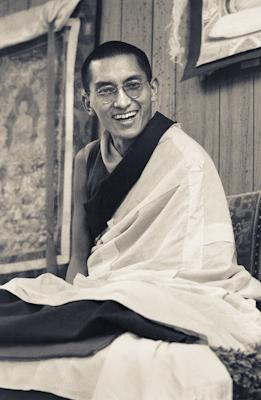The Aim of a Spiritual Practice
A teaching by Lama Zopa Rinpoche about the purpose of meditation and the spiritual path, at the 25th Kopan Course in 1992.
This is an edited excerpt from Lecture Eight in Section Two of the course. Click here to read more of the unedited lecture.

If our aim in practicing meditation and following the spiritual path is not clear, because our life is so busy and there are many distractions, we may only want some calmness in our life and short-term peace and quietness in our mind. The only motivation for practicing meditation may be just to have some quietness in the mind—like a little rest for the mind. We may want to give our mind a little rest, just as we relax our body and rest, without working—we just lie down and relax at our house or we go to the beach.
If the purpose of our meditation is just to feel this calmness and peace for a short time, then breathing meditation is enough. Just watching the sensation in the body, and trying to focus the mind on any object, such as watching our breathing or meditating on our shoes or something. [Laughter] Just keeping the mind on any object for a short time brings some peace, because we try to stop all our other thoughts during those minutes. It’s similar to having a good sleep. When we have a deep sleep, we don’t have those disturbing thoughts arising, so we have some peace and quietness of mind.
Generally, if our aim in life is not clear and we are not sure, then our path is not clear. We don’t know how to make decisions in our life and we don’t know what is best. We become very confused and it is difficult to tell if the decisions that we make are right or wrong. If the aim and purpose of our life is not clear, then any normal life decisions become very confused and it is difficult to discriminate what is right and wrong, even without talking about meditation and the spiritual path.
If our aim in life is to benefit other sentient beings and obtain happiness for other sentient beings, then our purpose becomes clear and if we analyze whether our decisions and actions support this aim or not, it is easy to discriminate whether we are right or wrong, and bring benefit or not. Without this aim in life, we don’t know who or what our actions benefit, so it is not clear and it is very easy to become very confused.
As I mentioned yesterday quite extensively, the aim of our life is to free all sentient beings from all the sufferings and to obtain happiness for all sentient beings. As this is the meaning of life, we should direct our life towards this goal of not only temporary but especially ultimate happiness for every other sentient being.
Sentient beings are so kind and so precious, and each day, each minute, our survival depends on their kindness. Each minute, each hour that we are human, we have this incredible opportunity due to the kindness of all sentient beings, including the parents of this life. This is the reality and there’s no way to live life without working for others and cherishing other sentient beings. There is no time to work for ourselves and no time to be concerned only with our own happiness. In reality, sentient beings are unbelievably kind and precious, and there are also many deeper ways to meditate on their kindness.
If the aim and purpose of our life is to obtain happiness for all sentient beings, whatever we do— marriage or no marriage, traveling or not traveling, studying or whatever—everything we do is on the basis of this aim, and we can check whether it is beneficial or not.
Our goals can be categorized into three levels: great benefit, middle benefit and small benefit for others. We should do all three levels if we can—great, middle, and we should offer even a small benefit for other sentient beings. If we cannot do both great and small benefit, then we should do the greater benefit—we should leave the small benefit and do the great benefit. If we don’t have the capacity to do all three, then do whichever has the greatest benefit and leave the small benefit, because we don’t have enough capacity to do everything for others.
It’s similar for our meditation practice and spiritual path—if our aim is not clear, then our path is not clear. We should aim to practice meditation and follow the spiritual path, but if our aim is not clear, then the path we are supposed to practice and how much we have to practice is not clear.
I mention these subjects and the kindness of other sentient beings because the meaning of our life is to benefit and serve all other sentient beings. Bringing the most important happiness—the long-term happiness of future lives—to other sentient beings is more important than just day-to-day life and short-term comfort and happiness. Ultimate happiness—the cessation of the entire suffering and causes—is even more important than temporary or long-term happiness and the happiness of future lives for other sentient beings. This everlasting happiness for other sentient beings is even more important than their short-term happiness.
